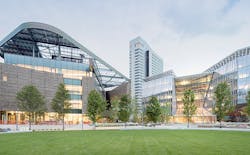Cornell University's ambitious tech campus opens in New York City
Cornell Tech, Cornell University's technology-focused campus on Roosevelt Island in New York City, celebrated its official opening Wednesday.
Cornell Tech officials describe the campus as the first ever built for the digital age. Its goal is to bring together academia and industry to create leaders and conduct transformational new research, products, companies and social ventures. The schools says the campus features some of the most environmentally friendly and energy-efficient buildings in the world.
Cornell Tech had its beginnings in 2011, when the proposed campus was named the winner of Mayor Michael Bloomberg’s Administration’s Applied Sciences Competition, which sought to a national hub for tech. New York City officials estimated in 2011 that the new campus would generate up to 8,000 permanent jobs, hundreds of spin-off companies and more than $23 billion in economic activity over 35 years. The campus is built on 12 acres of city-owned land.
Cornell Tech’s mission of collaboration and innovation is reflected in the design of its Roosevelt Island campus. It provides space to think, but is also integrated—in both mission and design—with the city. The campus master plan was designed by Skidmore, Owings & Merrill and includes innovative features and facilities
The first phase of the campus includes:
•The Emma and Georgina Bloomberg Center. It is the first academic building on campus. Cornell University received a $100 million gift from Bloomberg Philanthropies in 2014 for the campus. It has a variety of spaces designed to support different learning modes, including flexible spaces to encourage collaboration as well as private work spaces.. The Bloomberg Center aspires to be among the largest net-zero energy buildings in the United States; all of its power is generated on campus through a variety of site-specific strategies to reduce energy demand and use renewable energy. The architect is Morphosis Architects.
•The Bridge is a building where cutting-edge companies from diverse industries will have the opportunity to work alongside Cornell academic teams. The building features gathering areas on each level, including a light-filled, multi-level tech gallery and a rooftop terrace sheltered by a solar trellis.
The architect is WEISS/MANFREDI.
•The House is the tallest and largest residential Passive House high-rise in the world. Passive House is the strict international building standard that drastically reduces energy consumption while creating a more healthful and comfortable living environment for a fraction of the’ usual energy costs. Cornell faculty, staff and students live at The House and give the campus 24/7 activity.
The architect is Handel Architects.
•The open space anchors the campus, fostering collaboration and innovation and inviting the public into the campus. The campus engages Roosevelt Island’s esplanade and water frontage while maximizing views of Manhattan and Queens.
The heart of Phase 1’s 3.5 acres of open space is the Campus Plaza, a multiuse central gathering space. Connected to the Plaza is the quarter-mile long Tech Walk, a central spine that features a series of active and social spaces that are linked by pedestrian pathways.
Throughout the campus, outdoor and indoor spaces are connected so that people can move easily and comfortably in and out during the course of the day. The open space features resilient design, including rain harvesting for irrigation, subterranean gravel trenches that hold and slow down storm water; a series of bio-filtration gardens that treat stormwater runoff non-mechanically before it enters the river; and a geothermal field that provides energy to The Bloomberg Center.
The landscape architect is James Corner Field Operations.
While the campus has been under construction, Cornell Tech was housed in a temporary space provided by Google. It has already graduated more than 300 masters and doctoral students, Cornell Tech’s 30-member faculty has launched research in the areas of human-computer interaction and Social computing, security and privacy, artificial intelligence, data and modeling, and business, law and policy.
“We are entering a new era for tech in New York, and the Cornell Tech campus is at the heart of it," says Cornell Tech Dean Daniel Huttenloche. "Cornell Tech was given the rare opportunity to create a campus and academic program from scratch. The opening of our new campus brings together academic disciplines critical to the digital transformation of society and the economy, together with companies, early stage investors, and government to spark innovation and help improve the lives of people throughout the city, country and world."
Later this fall, Cornell Tech will begin construction on the Verizon Executive Education Center and Graduate Roosevelt Island Hotel, targeted for opening in 2019.
When fully completed over the next few decades, the 12-acre campus will be home to more than 2,000 graduate students and hundreds of faculty and staff.
